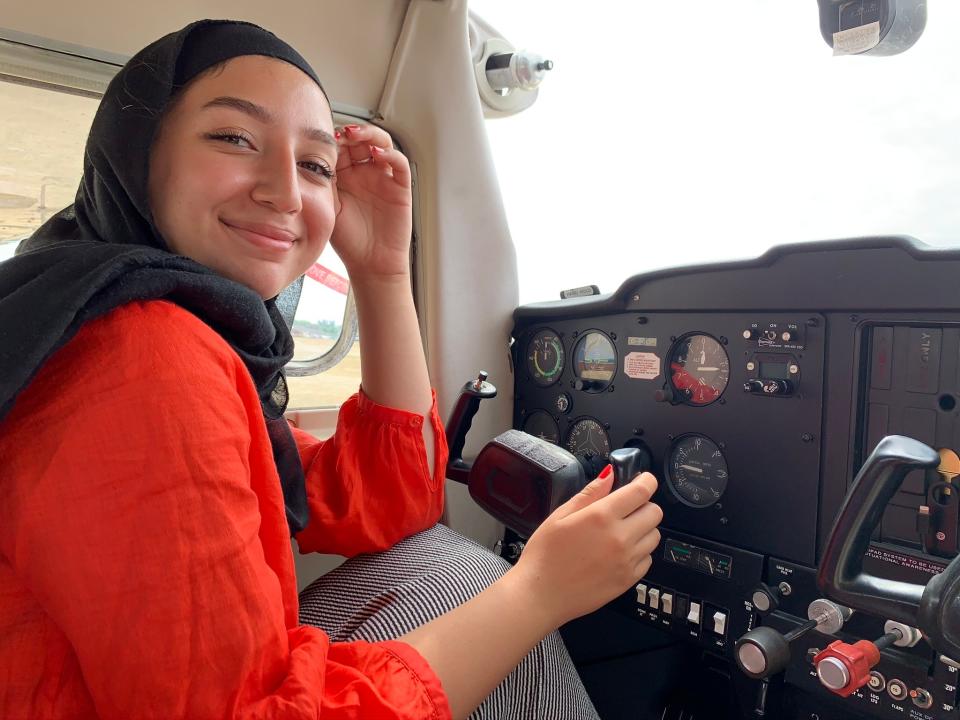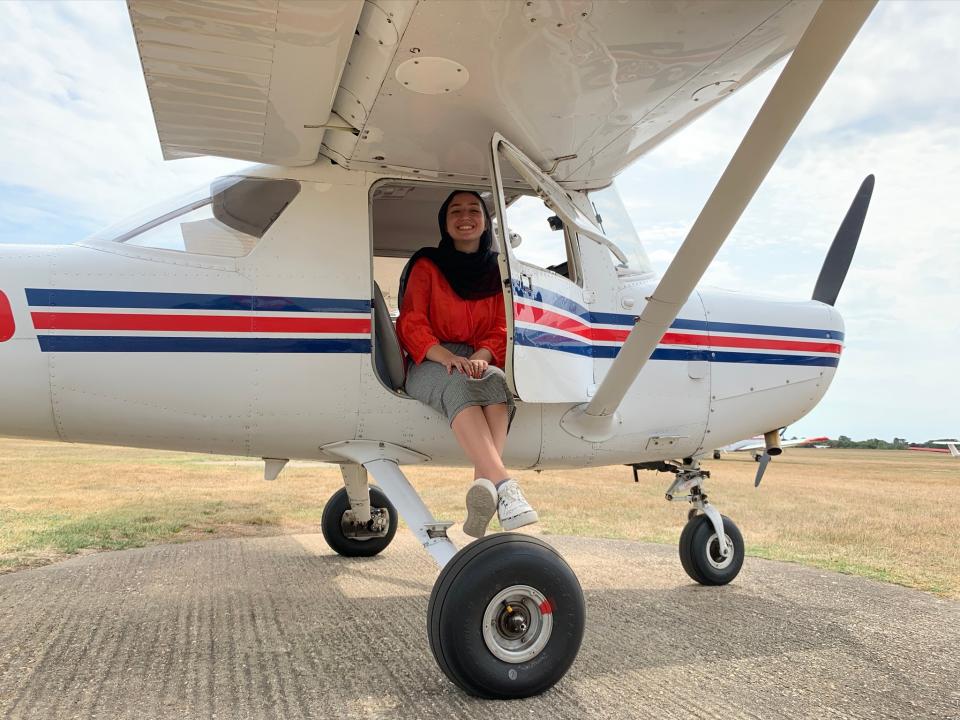How Maya Ghazal Became the First Female Syrian Refugee Pilot
In 2015, at the age of 16, Maya Ghazal was forced to flee her home in Damascus, Syria, with her mother and two younger brothers, and go to the U.K. where they were reunited with her father, who had arrived in the country a year earlier. Ghazal saw this move as her “great new beginning.” She had big hopes and dreams and believed life would get back to some kind of normality, but unfortunately, this was not the case at first and she experienced stigmatization and hostility.
In her 2018 TEDxPalaisDesNationsWomen talk, she pinpointed the one big difference between refugees and most other people: “We lost our homes and have been forced to seek safety in another country. But that is a change of circumstances… not a change from a person into a problem.” She went on to deliver five important steps that restored her hope and should be available for every refugee: do not label; regard education as important as food, water and safety; support university places for refugees; girls can do anything; and believe in us.
This year, the 22-year-old was appointed goodwill ambassador for UNHCR, the U.N. Refugee Agency. Through powerful speeches, which she has delivered all over the world, Ghazal advocates for refugee inclusion, access to education and job opportunities, and counters negative stereotypes. In 2020, she fulfilled her goal of becoming the first female Syrian refugee pilot, and now has ambitions of becoming a commercial airline pilot.
In the days preceding World Refugee Day—held every year on June 20—Ghazal shared her story with Vogue, from her early life in Damascus to her career in the sky.

United Kingdom. Maya Ghazal achieves her Private Pilot's License
Photo: ©UNHCR/Lana CorrineVogue: What are some of your last memories of life in Syria before you left?
Maya Ghazal: When the conflict in Syria started in 2011, I was about 12 years old. We were in Damascus so at first we weren’t affected directly. Knowing it was the foundation of our future, my parents were keen for my two brothers and I to continue our education. I had to change schools about three times because the areas that were safest from bombing kept changing. Whenever our parents left for work (my father owned a shop and my mother is a photographer), we said goodbye in case we never saw them again. That was the situation for many years and we had to normalize it; children mature so much quicker because death is never far away.
Can you recall your first impressions of the U.K.?
One of the first encounters my mum, brothers and I had was with U.K. customs. Even though we had refugee status and came into the country legally on family reunion grounds, uniformed officers took us into a room and questioned us after our long journey via Beirut and Turkey. They pulled out a map of Syria and asked us where we were from and where my dad was. The only English I knew was what I had learned from Grey's Anatomy and 50 First Dates [laughs]. At one point, I started to cry and that’s when they finally let us through. We initially settled in Birmingham before moving to London.
Where did you find hope after leaving Syria—a country you loved and at one time had aspirations of representing as a diplomat?
It was life and death going to school in Damascus. I got my secondary school qualifications—the equivalent to GCSEs—but, when I got to the U.K., every school I took them to saw them as useless. I had all the determination in the world; education was the most important thing to me and it was at risk of being taken away. I worked really hard on my English—reading books and listening to music; writing down every word I didn’t know and looking it up in a dictionary. I wanted to apply to study aviation engineering at Brunel University in London and a teacher at one school believed in me. I went back for a test the following week and did pretty well, so they accepted me.
Your interest in engineering drove you to get your pilot’s license. How do you feel when you’re thousands of feet up in the air?
Getting a flying license isn’t like getting a driving license; you have to do 45 hours minimum with different instructors before flying solo. A pilot is always prepared for the worst; they must know how to tackle every situation from a fire to engine failure. At the end of my first solo flight, I bounced when I landed because I was going too fast. I wasn’t used to the plane being so light—that’s the day I lost any fear I had. It is so freeing being up there.
Where would you like to take your career as a pilot? What would be the dream scenario?
I’d love to have a commercial license. Then, one day I would love to be able to land a plane in Syria. I’m a British citizen now—this is where I've made my dreams and ambitions a reality and I will be forever grateful for that—but I will never let go of my Syrian nationality. I’m so proud of who I am.
In your 2018 TED talk, you set out five solutions to better understand refugees and invest in their potential. Have those solutions changed at all?
The solutions would be the same, but I didn’t mention sport in my TED talk—the announcement of the Refugee Olympic Team [for the 2016 Rio games] was a very important step. The National Health Service is such a core part of life in the U.K., so now I would like to see the 82.4 million displaced people around the world being included in national health systems. By investing in refugees and giving them their basic human rights, from access to healthcare and clean water to education, we are enabling them to thrive.

United Kingdom. Maya Ghazal achieves her Private Pilot's License
Photo: ©UNHCR/Lana CorrineHow do you want to use your role as UNHCR goodwill ambassador?
Only 77% of primary-school-aged refugee children have access to education. Due to COVID-19, even fewer refugee children are going to school, making girls especially more vulnerable to early marriage, discrimination and exploitation. I feel very lucky to be able to raise awareness about these issues through my position with UNHCR. As a goodwill ambassador, I share my story as a refugee who's been given a second chance and managed to follow their dream. I want to show that refugees have the determination to succeed with the help of their new community.
What are a few things everyone can do to stand up for and improve the rights of refugees around the world?
Educate yourself and your community—the more you know about the real story of refugees, the better. Don’t stereotype us. There are so many resources on the UNHCR website and social channels with reliable statistics and ways you can help, depending on which part of the world you are in. The organization plays a vital role in ensuring refugees have the life they deserve, which is a normal life—nothing special. Small acts of kindness can make a huge difference.
Originally Appeared on Vogue

